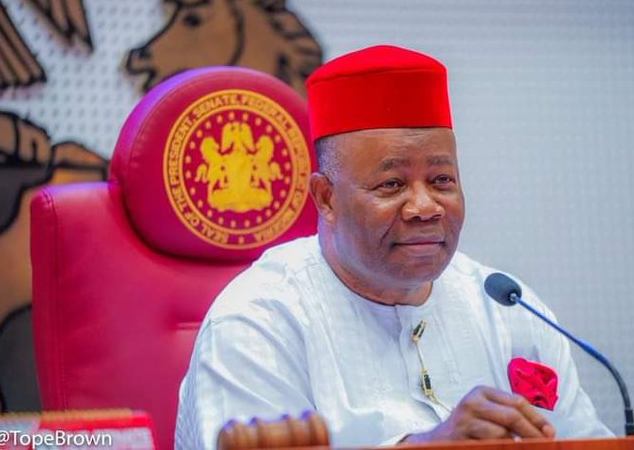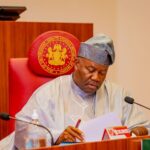Nigerians will be fine with the Senate president if this government is just and the state of the economy is prosperous. They would rather enjoy the drama that comes with politics, especially the limited intellectual display of those politicians who enjoy their time on TV and social media. But this is not the case; Nigeria faces challenges of insecurity and socio-economic hardship—it is a national crisis. The citizens are angry about the current state of the economy, and they seek the highest leadership to take responsibility for every decision they make. The suspension of Senator Ningi has only added to the anger.
So, it is concerning to see how some Southern senators are choosing to sectionalise Akpabio’s despicable behaviour instead of treating it as a national crisis. This is a Senate president who chose to suspend Senator Ningi for highlighting that N3.7 trillion out of N28.77 trillion, 12.9% of the total budget of 2024, is unattached to any project. Let’s not forget that the budget has a deficit of N9.18 trillion and only N7.8 trillion was sourced as of January, meaning N1.38 trillion is expected to be raised from other sources—borrowing or more taxes. If the unattached N3.7 trillion were removed from the total, the deficit would reduce to N5.48 trillion, which means there would be N2.32 trillion in excess. In an ideal world, this should not be rocket science that requires sectionalisation.
Southern politicians are famous for their emphasis on Western education, entrepreneurship and morals, but the defence of Akpabio by these senators is making it doubtful, especially when one puts it in the context of ethical leadership and accountability. It is clear now that Akpabio’s ascension to the Senate presidency was not based on merit or competence, but rather, he was selected based on zoning and regional support. If Akpabio is the best lawmaker they have on offer to lead the Senate, then it is pitiful. Surely, Nigerians cannot rely on such to lead its legislative arm.
However, we have a group of senators from the South who are trying to sweep the alleged crime under the carpet by using the regional card, effectively turning a blind eye to the double-dealing of 12.9% of the country’s annual budget. The energy put into dividing the Senate would have been used to seek a competent replacement from the other 51 senators. Calling the pressure on Akpabio civilian coup by Senator Bamidele is inappropriate and uninformed.
We are set to develop land for FG’s food programme-says Governor Sule
Expert urges FG to establish herbal medicine units in major hospitals
Yes, all three Senate presidents who were removed were indeed Southerners – between 1999 and 2007. Senator Evan Enwerem, who served from 29 May 1999, was impeached until 18 November 1999 over allegations of falsifying his name and age, where 90 senators voted in support of the impeachment. Similarly, Senator Chuba Okadigbo, his successor, was impeached in August 2000 amid accusations of corruption and financial mismanagement. The Senate voted 81-14 in favour of removing Okadigbo after he refused to comply with an earlier resolution asking him to resign or be impeached.
Lastly, Senator Adolphus Wabara resigned in 2005 before an official motion could be moved against him following allegations of bribery connected to the budget process—a scandal that implicated several other senators and government officials.
Bamidele should have mentioned the removals in the lower house. Salisu Buhari, a northerner, was impeached as the Speaker of the House of Representatives in 1999 due to a scandal involving the falsification of his age and academic credentials. I guess he omitted this part because it does not conform to his narrative. Likewise, he could have mentioned that Senator David Mark, a northerner, demonstrated exemplary leadership during his tenure.
So, in the wake of these allegations against Akpabio, Nigerians must question the position of the southern senators who continue to support him. Accusations of budget padding are not a behaviour that the National Assembly tolerates, as seen with Wabara. It makes Akpabio’s case more challenging as the presidential spokesman also made similar accusations. It is puzzling to see how regional loyalty is used to suppress people’s rights for accountability.
On the contrary, the support from these senators not only undermines the fight against corruption but also raises concerns about their commitment to Nigeria’s democratic values. The southern senators have the option to reflect on whether allegiance to Akpabio aligns with the best interests of the country. Or they can choose to set a culture of impunity in the National Assembly as Ningi remains suspended. But we must stop thinking it is only about reinstating Ningi, but that too.
The lawmakers have a responsibility to their constituents and the nation. They must critically evaluate whether Akpabio has the leadership qualities necessary to take Nigeria through these challenging times. They can start by asking the simple question: Is Akpabio the finest from the South?

 Join Daily Trust WhatsApp Community For Quick Access To News and Happenings Around You.
Join Daily Trust WhatsApp Community For Quick Access To News and Happenings Around You.

